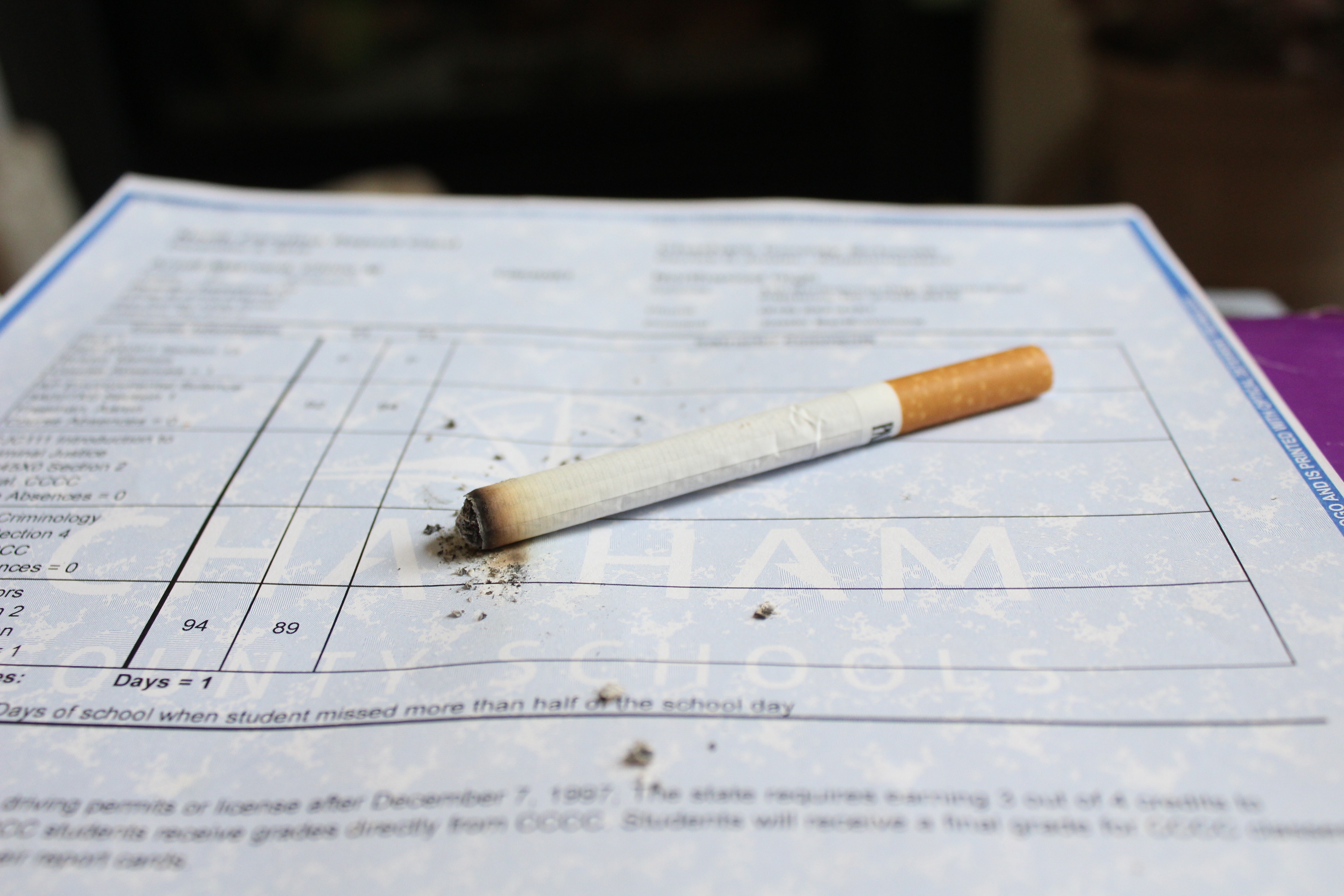The names of juniors Maria Hill, Caroline Chester and senior Jack Dotson have been changed to protect the students’ identities.
“I definitely think I’m addicted,” junior Maria Hill said. “It’s kind of like I need cigarettes. I rely on them, so that’s how I know I’m addicted.”
Hill is a regular smoker, and she consumes up to half a pack of cigarettes a day.
“The first time I ever smoked a cigarette was in eighth grade,” Hill said. “I was sitting in my room, and I saw my mom smoke cigarettes, so I went to the kitchen, and I stole one of the cigarettes from her pack. I opened my window in my room, and I smoked it out of the window. I wasn’t inhaling the cigarettes, I was just like pulling the smoke in my mouth and blowing it out. I remember inhaling for the first time. I set down the cigarette and threw up all over myself.”
Hill’s first experience with cigarettes is not uncommon among smokers. According to the Centers for Disease Control and Prevention (CDC), nine out of 10 cigarette smokers tried their first cigarette before the age of 18. They also reported that 9.3 percent of high school students in 2015 admitted to smoking a cigarette in the past 30 days.
According to science teacher Sarah Robertson, teenagers have been smoking cigarettes for years. However, sophomore Taylor Puckett believes that it is on the rise at Northwood recently.
“A lot of people I know smoke cigarettes, and I think it’s pretty stupid,” Puckett said. “I don’t understand why it’s such a trend now.”
Senior Jack Dotson recalled the first time he smoked a cigarette.
“I was in like seventh or eighth grade, and I was at home sick one day, and we had [cigarettes] in our house for bee stings (using the tobacco in cigarettes to soothe a bee sting is a common home remedy), and I went out and smoked it,” Dotson said.
Robertson believes that a larger problem may be the recent increase in use of devices like electronic cigarettes. According to the CDC, 16 of every 100 high school students reported in 2015 that they used electronic cigarettes in the past 30 days—an increase from 1.5 percent in 2011.
“I think vaping is [making a comeback], and the store across the street is probably not helping matters,” Robertson said. “The fact is that the information about vaping is completely misleading. People are like, ‘Oh, it’s just harmless. It’s just water vapor.’ There are chemicals in there, in fact one of the main chemicals that’s in e-cigarette juice is the same chemical that we use to preserve our specimen that we dissect in anatomy… There is not enough time that has gone by to know the long-term effects of vaping. So I think that cigarette smoking might be going down, but vaping is definitely picking up because too many kids think that it’s harmless, and it’s not.”
Dotson and junior Caroline Chester both engaged in other forms of smoking before trying cigarettes, but do not believe it influenced them. Hill, however, thinks these actions may have influenced her.
“I used to vape, and I didn’t really like it that much, and I used to smoke weed, but it gave me anxiety,” Hill said. “I wouldn’t really say it led me to smoking cigarettes, but it came before it, so maybe.”
Growing up around family members that were cigarette smokers impacted Hill’s decision to smoke.
“My mom smokes and my grandma smoked for about 30 years,” Hill said. “I think that being around my mom smoking all the time probably influenced my decision on me smoking or not, because I would always see her do it, and I’d be like, ‘Maybe I can try it one day.’ I tried it, and I didn’t like it, and then a few years later I started smoking again, so I definitely think that she influenced me a little bit.”
No matter how cigarettes were first introduced to them, Hill and Chester share a similar reasoning behind continuing the habit.
“I would maybe smoke like twice a week,” Chester said. “I did not smoke that often, and if I smoked any more than that, then it was due to something that had happened or stress or something like that.”
According to Hill, smoking relieves her stress and helps calm her anxiety.
“Smoking is a stress reliever because right before I do my homework, I usually smoke, and right after I do my homework I smoke,” Hill said. “It just calms my nerves, because it’s kind of like you sit down, and it’s just something that you have to yourself while you’re alone.”
Although Hill is currently a smoker, she hopes to quit one day.
“I definitely plan to quit in the future, but I don’t think I can quit now,” Hill said.
Dotson, however, said he does not plan to quit anytime soon, and Chester has already quit.
“I quit just because I felt as though my stress levels had gone down, and I didn’t feel like I necessarily needed that kind of release anymore,” Chester said. “It wasn’t hard for me honestly. I just finished my last pack and threw it away, and I haven’t smoked anything since.”
Robertson explained the effect smoking has on the body, such as the chemicals involved and how it changes the physiology of the brain. According to the CDC, cigarette smokers are 15 to 30 times more likely to get lung cancer or die from lung cancer than nonsmokers.
“First off, you’re inhaling hundreds of carcinogens, so you’re playing with fire every time you take a drag off of either an e-cigarette or a regular cigarette,” Robertson said. “It stimulates the circulatory system, it stimulates the brain; it actually causes the brain to have to rewire a little bit as far as the way that nicotine plugs in. That’s why quitting is so difficult, because you actually have to rewire the way the synapses work in the brain.”
– By Chloe Maynard



